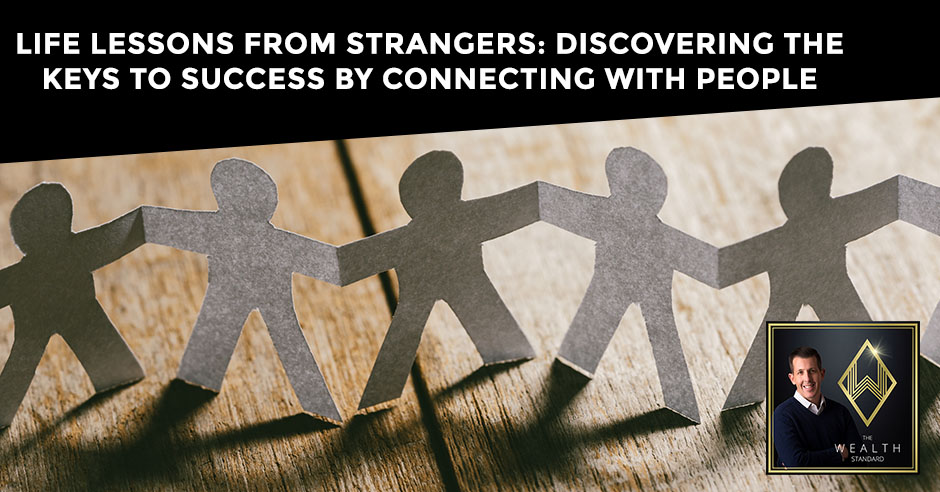

There’s so much to learn from every individual we meet. The right connection with the right individual might unlock the secret to a successful life. In this episode, Patrick Donohoe shares two eye-opening conversations he had with two individuals who are very different yet equally successful in their own ways. He details his chance encounter with renowned golf course architect and designer Robert Trent Jones Jr., who is still filled with so much passion for his job at 84 years old. In another interaction, Patrick recounts his meeting with former NFL player and Hall of Famer Emmit Smith, now a sought-after speaker and best-selling author. Tune in as Patrick shares the valuable life lessons he received from these great individuals and why it’s important to connect with the people around us.
—
Watch the episode here:
Listen to the podcast here:
Life Lessons From Strangers: Discovering The Keys To Success By Connecting With People
Tony Robbins has said that the eyes are the gateway to the soul. I’m about to participate in an event in Northern Utah called 29029 Everesting, which is essentially hiking up a mountain multiple times until you reach the elevation of Mount Everest. It’s done in about a dozen locations around the country. At least it was previous to COVID just a handful of times this year.
I just came from a conference on the island of Hawaii, and so I did not have time to be in my office and record an episode for the week, but I’m going to record some audio sound blips as I hike up and down this mountain because it is challenging and specifically commenting on the nature of being in this team environment where there’s another 100 or some people hiking with you, encouraging you and just some of the success stories that come from it.
I wanted to do is comment real bridge last episode with this event that I’m doing with two conversations I had with Hall of Fame individuals. One is a professional athlete, which most of you will know. Another is also a Hall of Fame individual in the Golf Hall of Fame, who you may not know. When I was at this conference, I had the opportunity to play golf. It’s a famous course called Poipu. The Poipu Golf Club is a PGA event that’s held there. It’s a beautiful golf course. The grounds are incredible they have these two ocean holes that are magnificent. I got to play it a couple of years ago and it was a joy to play it again.
As we were leaving the 18th hole, there was an individual that approached us. He was in a golf cart, somewhat to disheveled this old green golf hat and wrinkly. You could tell that it been worn a million times. He was driving along the path. We were exiting and he was older in age, and he asked, “How’d you guys like the round of golf? How’d you like the course?” We were like, “It was incredible. I played here before and these were their first time playing. It was beautiful. It rained a little bit.” He was like, “This is one of the most famous courses or the most favorite courses that I’ve designed.”
I was like shocked. The individual next to me is like, “Did you helped with the grounds crew? Did you helped build it?” He’s like, “No. I designed this course.” This gentleman that I was playing golf with is an avid golfer and knows golf history. His son plays on a NCAA Division one team back East. He’s like, “What’s your name?” He said, “My name is Robert Trent Jones Jr.”
My partner was like, “No way.” He had probably a dozen bud lights by that point, maybe a few more. He said, “Show me your driver’s license,” to get him to approve it. This guy, which I’m sure that was not anticipating that question, opened up his wallet and didn’t have his driver’s license on him, but he had an American Express Black Card that said Robert Trent Jones Jr. on it.
Hunger is a never-ending principle of life. Click To TweetWe got to laugh out of that, but then we start a conversation and he had this journal that he was showing us that mapped out a lot of the courses that he designed. It showed some of the drawings. He’s written poems about the golf courses that he’s designed anywhere from Indonesia to Hawaii. He was up in Hawaii doing a redesign of a golf course in Princeville, which is in the Northern part of Kauai. He’s been in Mexico. He’s been all over the world designing hundreds and hundreds of golf courses and his father, Robert Trent Jones Sr., I think he did an upwards of 600 either designs or redesigns of golf courses. It was in the family. It was becoming a legacy.
We’d have this conversation, and I remember it distinctly where he started opening up his book and looking at us. I looked straight into his eyes and it was an unbelievable connection where I saw how much this man loved what he did. As he was flipping through his journal and diary, there were pages that were earmarked. Clearly, the book had been used many times to show other individuals, but it was truly inspiring to have a conversation with the man who discovered his calling in life, and he wasn’t done. I think he’s 83 years old, almost 84. You could tell that he lives in breathes what he was meant to do in life and it was an incredible lesson.
I mentioned in the episode that when we connect with people, whether it’s a stranger in line at the coffee shop, someone at the airport or someone at a restaurant, those are people that we’re meant to meet. You may not think that. You may be skeptical, but there’s a stoic idea around the fact that the people we come in contact with, we are meant to communicate with them.
We’re meant to connect with them. At least I speak for myself. Don’t take the opportunity to do that at a deep level. I connected with this individual, Robert Trent Jones Jr., through his eyes and saw how powerfully he loved his life. How much he loved doing what he did. He got to travel all around the world. He was at this golf course because there was a group behind us that was playing.
They’re part of the golf club there and he was going to show them some of the designs for the golf course up in Northern Hawaii. As he ended our conversation, I started to have a conversation with them, he didn’t skip a beat as far as the passion and the excitement that he had for what he was going to do and talk about golf, golf courses and golf course design with these gentlemen who also had, apparently, a passion for golf. That was my first interaction and my connection.
The second one was with a Hall of Fame running back for the Dallas Cowboys name Emmitt Smith. Many of you will recognize that name. He was a guest speaker at the conference I was at. There were two phases of our conference. We were at phase one. There was another phase two and another group of people coming in after us.

Successful Life: When we connect with people, whether it’s a stranger in line at the coffee shop or someone at the airport or at a restaurant, those are people that we’re meant to meet.
He was the last speaker on the morning. We were departing and he was going to speak that evening to the other group that was coming in. There were only a few people there, and many people had already left on their flights but there are 25 to 30 people in the room. It was a general question and answer, and he talks about two distinct things. He talked about the team and the idea of hunger, the principle of hunger. I didn’t get to ask him any questions there. I didn’t get to interact with him personally.
After this little speaking engagement, we are checking out of our room and went to have breakfast. My family went to have breakfast. I went to the gym and, lo and behold, as I was getting my workout underway, Emmitt Smith walks in and gets on the Peloton bike that was right next to me and started doing his workout.
I said, “I enjoyed his talk in the morning. I was grateful that he was there,” then I get into my workout. We talked for about an hour and a half. When I was done, he was getting out of his workout and we were the only ones in the gym. I went up to him. He didn’t have any water bottle with him, so I gave him some water. I said, “I really enjoyed your talk this morning. There are two things that I took from it, and I’m super grateful because I have been thinking along these lines lately.”
The first thing was the idea of teamwork. I told him, “What I’ve discovered in some of the most successful businesses, including my business, are those that have participated in successful teams in the past, and most of it is through sports teams, especially at a very high level, maybe high school but collegiate or professional levels.” There’s an individual that’s on my team at Paradigm, who was a Commander of a Navy Submarine for twenty years and retired as a Commander.
The idea of teamwork within the military is profound. The success, as far as individuals are concerned, comes from how they see their role on their team. That’s what he spoke to that morning, whether it’s Terrell Owens or other athletes who are very individualistic, egotistic and don’t operate that well on teams that tend to ruin the culture of a team.
Emmitt Smith, even though he was individually accomplished, he accredited a large part of his success to his team. The second principle was the idea of hunger. I said, “Hunger is fleeting because you can be hungry and it drives you for a moment, but when that moment is gone and when achievement is made, that hunger no longer gives you the drive for the next level.” He’s like, “I totally agree.”
Never discount the moments of opportunity where you're able to connect with somebody. Click To TweetHunger is a never-ending principle of life. Finding something to be hungry about, passionate about driven to accomplish or to achieve. I said, “With teamwork and hunger, did you know that as you exited the NFL?” He’s like, “No. I experienced it, but I didn’t understand how teamwork applied to business.” Now he’s a successful real estate developer in Texas and a couple of other areas I believe but the idea of hunger where he had hit all of these major levels in his professional career and getting to those levels and more levels just wasn’t possible anymore. Hunger, drive, and the why behind his new achievements had to be discovered, and it’s a never-ending process because once another level is hit, it’s again circling back and finding something else to be hungry about.
The lessons from these two interactions are as follows. First, you don’t ever know who you’re going to meet, and just like I had this eye contact and presence, which I’ve been working on a lot over the last couple of years with Robert Trent Jones Sr., I did the same thing with Emmitt Smith where most people wouldn’t go up to him and start a conversation with them.
I didn’t start the conversation. I was like, “I know you love golfing. Let’s go golf before you leave and before I leave.” He declined because he had to give a speech that night, but recognizing that all human beings are the same in a sense, and they all, mostly at least love connection and love conversation. The fact that I went up to him is something I probably would’ve done a couple of years ago.
Knowing that connection is deeply important to me now, and specifically being able to connect and understand eye contact, presence and being there, the energy is profound and palpable. It was only about a 30-minute conversation I had with Emmitt Smith, but the idea is, when you’re able to connect at that level and have common ground that you agree upon and speak to, especially when it comes to principals, it’s a conversation I’ll never forget with both of those individuals.
That’s the first thing is never discount the moments of opportunity where you’re able to connect with somebody. It could be a Robert Trent Jones Sr. It could be Robert Trent Jones Jr. It could be Emmitt Smith. You’ll never know. As I mentioned, it could be a billionaire or your next business partner. It’s someone that can inspire you to take your life to the next level.
You don’t know but what you do know and if you can operate your life on this belief, a good call-to-action is to consider all of the connections and relationships that you have with people. When you interact with somebody, consider that as something that was meant to be and that moment as something that you were destined to fulfill. How are you going to fulfill that conversation? Are you going to be present? Are you going to have eye contact? Are you going to engage? There’s so much fulfillment that comes from that level of communication and conversation.

Successful Life: Seek out passion. Seek out something to be excited about when it comes to your vocation. Your zest of life is amplified when you participate in that.
The second is find something that lights you up in the morning. I would say seek not find. Find is a singular event. Seek out passion or something to be excited about when it comes to your vocation. Seek out like Robert Trent Jones Sr. something that your blood pressure raises your excitement level. Your zest for life is amplified when you’re able to participate in that.
Two more things, teamwork. Know your role on a team. Be part of a team. Even in business, we may think we have individual titles, responsibilities, and positions but we’re part of a team in a number of ways by understanding that other people play different roles and complement ours. It’s also being there when times are tough and willing to accept, help and support when times are tough for you.
The last thing is hunger. Know your why. I would say a very simple first principles idea behind success is your hunger. It’s that driving force behind why you’re doing what you’re doing. Hunger could be a level of lifestyle that allows you to take your family to places and experience things with your spouse. It may be individual, able to golf every Saturday, have a membership at a country club, or provide charitable contributions even time to cause you’re passionate about.
Find something to be hungry about. That hunger and why is going to drive you through the inevitable friction, difficulty and challenge. That stands in the way between where you are right now and what you want to accomplish and achieve. Guys, thank you for reading. You’re amazing. I appreciate the support. Check-in with the next episode, where you’ll know a compilation from this physical challenge I’m about to embark on. Until then.
Important Links:
- 29029 Everesting
- Poipu
- Emmitt Smith – LinkedIn
Love the show? Subscribe, rate, review, and share!
















